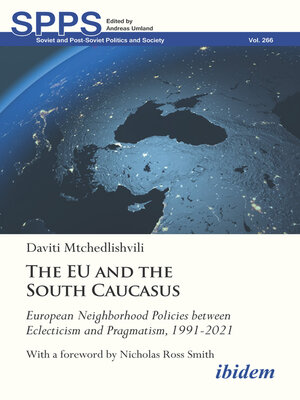The EU and the South Caucasus
ebook ∣ European Neighborhood Policies between Eclecticism and Pragmatism, 1991-2021: With a foreword by Nicholas Ross Smith · Soviet and Post-Soviet Politics and Society
By Daviti Mtchedlishvili

Sign up to save your library
With an OverDrive account, you can save your favorite libraries for at-a-glance information about availability. Find out more about OverDrive accounts.
Find this title in Libby, the library reading app by OverDrive.



Search for a digital library with this title
Title found at these libraries:
| Library Name | Distance |
|---|---|
| Loading... |
This book delves into the complex and often contradictory relations between the South Caucasus and European Union (EU). It covers the three periods of this relationship: the early contacts in the 1990s, the European Neighborhood Policy (ENP), and the Eastern Partnership Programme (EaP) that started in 2009. The book employs Europeanization theory and uses a mixed rationalist-constructivist framework as a complementary analytical instrument to decipher the two sides' behavior. The study's findings show that the complex relationship between the EU and the South Caucasus states cannot be explained through either a purely constructivist or a purely rationalist theoretical framework. Both, material and social motives are discernible. Thus, rationalism and constructivism are complementary tools for explaining the relations between the EU and South Caucasus countries. The rationalist perspective explains actors' preferences towards maximizing material utility and calculations by EU policymakers as to which strategy is most likely to advance the immediate interests of the EU in a given situation. This argument needs to be supplemented, however, with insights from constructivism. This approach emphasizes the universal nature of the values of the EU which are linked to internal dynamics in the EU and manifest themselves in the Union's relations with neighboring countries. The book finally illustrates how rational considerations, related to Russia's political and economic activities in the region, have determined the stances of the South Caucasus countries towards the EU.







